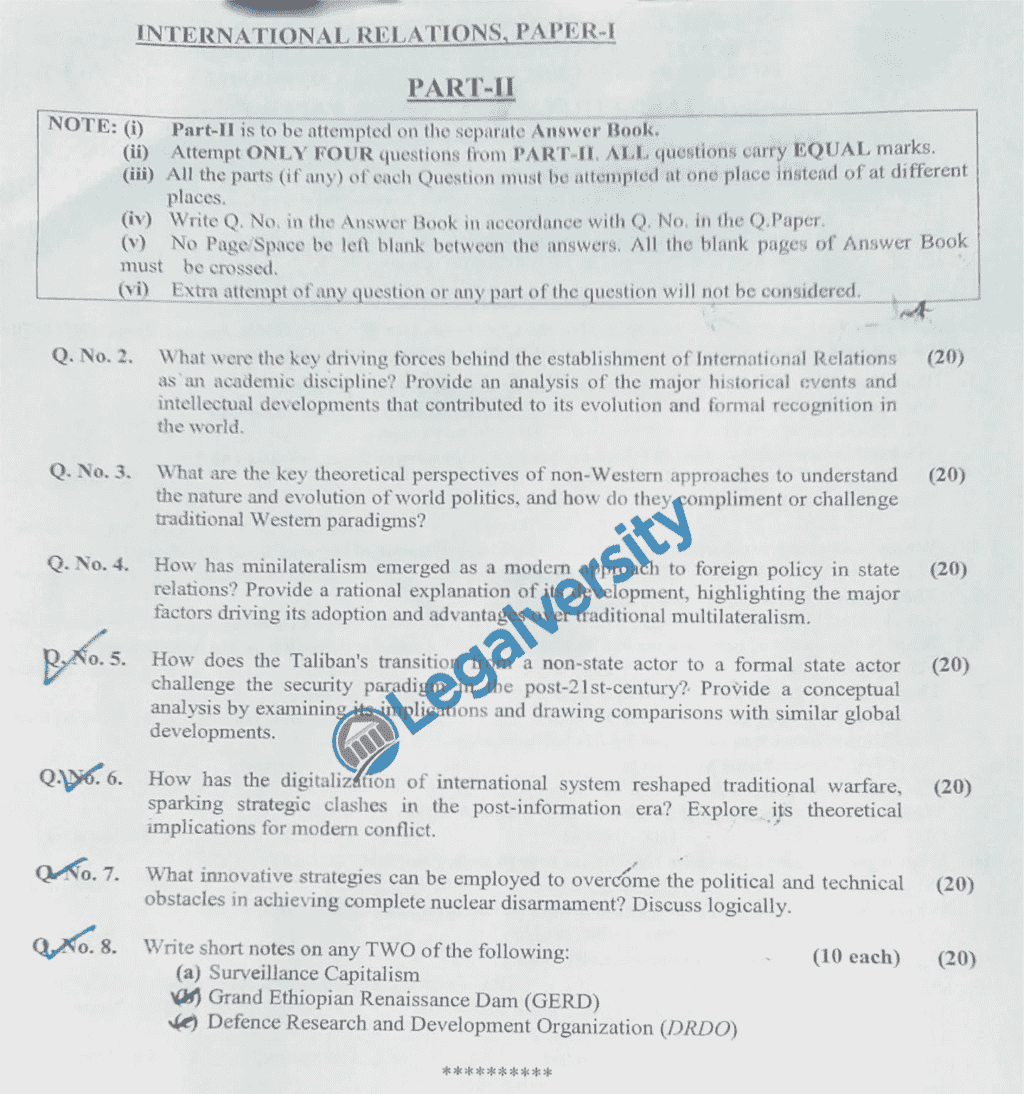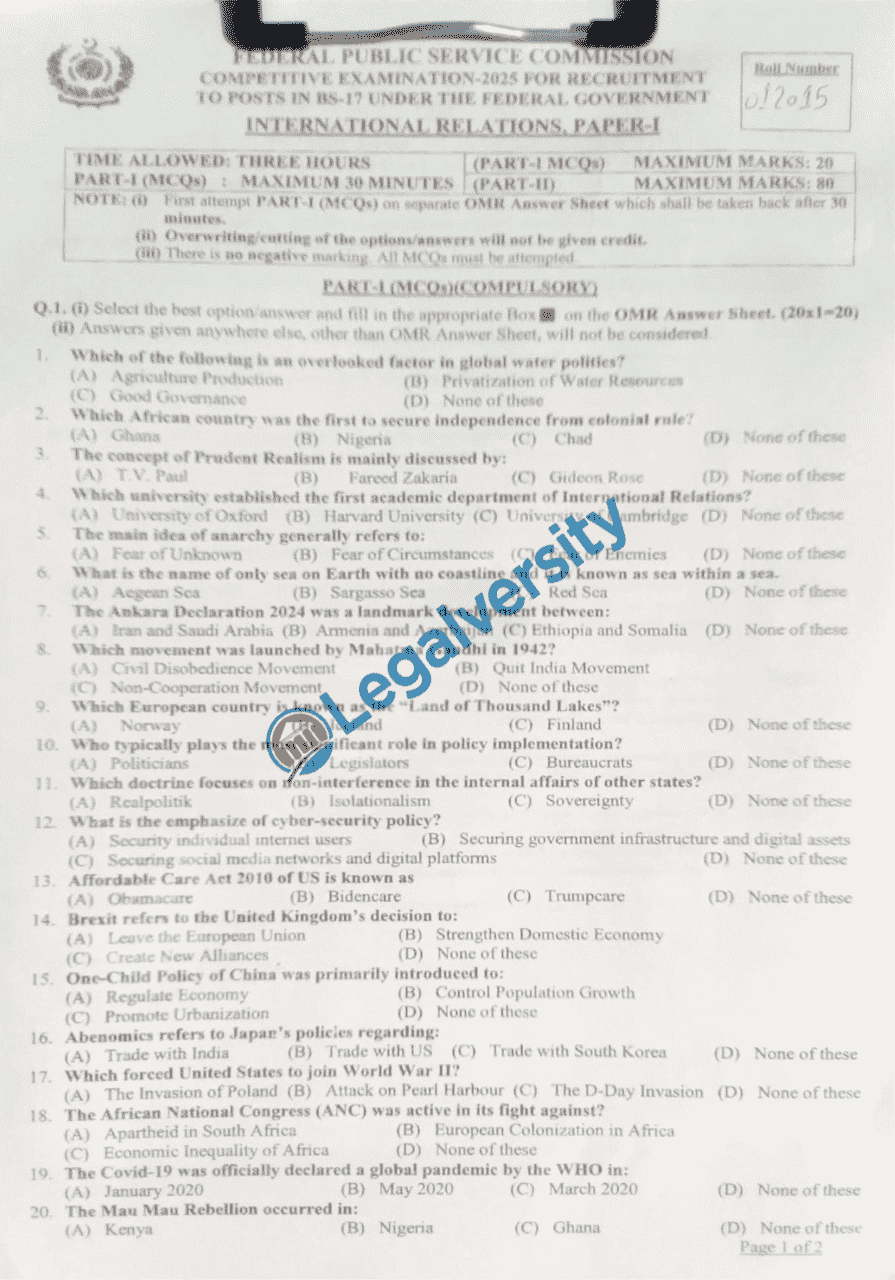International Relations (IR) is an optional subject in the CSS competitive examination 2025. Here, you will find the CSS IR past Paper-I 2025. I will also provide a summary of the paper, in which you will analyze what topics were given and how difficult they were. This lets you better understand the paper and prepare well for future examinations.
CSS International Relations (IR) Past Paper-I 2025
Q1. What were the key driving forces behind the establishment of International Relations as an academic discipline? Provide an analysis of the major historical events and intellectual developments that contributed to its evolutions and formal recognition in the world.
Q2. What are the key theoretical perspectives of non-Western approaches to understand the nature and evolution of world politics, and how do they complement or challenge traditional Western paradigms?
Q3. How has minilateralism emerged as a modern approach to foreign policy in state relations? Provide a rational explanation of its development, highlighting the major factors driving its adoption and advantages over traditional multilateralism.
Q4. How does the Taliban’s transition from a non-state actor to a formal state actor challenge the security paradigm in the post-21st century? Provide a conceptual analysis by examining its implications and drawing comparisons with similar global development.
Q5. How has the digitalization of the international system reshaped traditional warfare, sparking strategic clashes in the post-information era? Explore its theoretical implications for modern conflict.
Q6. What innovative strategies can be employed to overcome the political and technical obstacles in achieving complete nuclear disarmament? Discuss logically.
Q7. Write short notes on any TWO of the following:
- Surveillance Capitalism
- Grand Ethiopian Renaissance Dam (GERD)
- Defence Research and Development Organization (DRDO)
Critical Analysis of the Paper
The CSS International Relations paper is well-balanced in terms of history, theory, and modern global affairs, demanding both an understanding of concepts and self-reflection.
The first question examines how International Relations (IR) evolved as a discipline. It is all about major events such as World War I, the Treaty of Versailles, and the League of Nations. The evolution of realism, liberal institutionalism, and behavioralism shaped the fundamentals of IR. The question invites the candidates to connect major events in history to the evolution of IR as a particular discipline.
These alternative IR schools challenge the Eurocentric nature typical of traditional models. Asian, African, and Middle Eastern approaches center on their respective regional histories, civilizational interactions, and models of self-governance. All these perspectives synthesize into mainstream IR alternative perceptions regarding sovereignty, power, and progress, giving world politics a wider perspective.
Minilateralism is a new diplomatic instrument that reflects a shift from big agreements to small ones with a concentration on very particular issues. It suits the handling of international issues such as climate change and security cooperation and steers clear of complex bureaucracy, making it a suitable alternative to old multilateralism. This question tests how well test-takers can recognize new diplomacy trends.
The Taliban’s evolution from a non-state entity to a legitimate state power raises critical security issues. The evolution makes it challenging to apply traditional theories of state legitimacy, state governance, and counterterrorism policy. Comparison with previous examples, such as the political evolution of Hezbollah, can add depth to the analysis of Afghanistan’s contribution to regional security dynamics.
Digital technology has revolutionized war, taking battles away from conventional battlefields to cyberspace and information spaces. Cyberattacks, AI-based spying, and the dissemination of disinformation alter the nature of strategic conflict. Candidates must consider how such alterations impact the balance of power, military strategy, and national security policy.
Complete nuclear disarmament remains a distant vision due to political rivalries and technological challenges. New strategies such as regional disarmament treaties, AI-based verification, and economic incentives for non-proliferation can transcend current challenges. The answer must critically analyze the feasibility of international nuclear disarmament with an acceptance of realpolitik realities.
The short notes are about significant global issues. Surveillance capitalism explains how technology firms employ data in ways that are questionable ethically. The Grand Ethiopian Renaissance Dam (GERD) is a major issue in Africa about who has rights to water in the Nile. The Defense Research and Development Organization (DRDO) discusses how India is enhancing its defense technology.
The essay needs to be a combination of theory and practical analysis. The candidates must use historical background, contemporary affairs, and theoretical principles to illustrate comprehensive knowledge of international relations.
See the CSS IR past paper-I 2025


Also Read:
